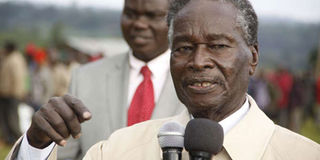Biwott made direct and inverse contribution to press freedom

National Vision Party leader Nicholas Biwott addresses a gathering during a fundraiser in aid of Tingwa Visionary Finance Community Based Organisation in Ainabkoi, Uasin Gishu County, on August 13, 2016. Justice Alnashir Visram awarded Biwott Sh30 million in damages in a case against British publishers. PHOTO | JARED NYATAYA | NATION MEDIA GROUP
What you need to know:
- Biwott contributed not only negatively, but also positively to the development of the defamation law.
Readers were fascinated by the stories published by the Daily Nation on Nicholas Biwott, who died on Tuesday this week.
The newspaper published more than 25,000 words — enough for a novella — about the man who “was part of a political and commercial network that in the 1980s and 1990s bestrode the national political landscape like a colossus,” as John Kamau describes him in his article, “Biwott used State House links to create business empire”, published on Wednesday,
PARLIARMENT
Githaiga Kairu is one of the readers who texted me at 7.50pm on Tuesday night to point out that writer Ibrahim Oruko in his article “Nicholas Biwott’s life was wrapped in a mystery” misses a crucial part of the ‘Total Man’’s history — that he entered Parliament in 1979 after Stanley Kurgat was prevailed upon to step down for him.
Mr Kairu was racing ahead of the Nation writers, as that fact was mentioned the following day by John Kamau.
“The entry into the big league for Biwott would come in 1979, when Moi persuaded Mr Kurgat to give up the Keiyo South seat for him.
"He was then elected unopposed and retained the seat for 28 years. It is within that period that he became a billionaire,” he writes.
DEFAMATION
The Nation articles also describe Biwott’s court battles in which he sued newspaper and book publishers for defamation.
Although the articles do not say so directly, Biwott contributed not only negatively, but also positively to the development of the defamation law.
Justice Alnashir Visram, then a High Court judge, awarded Biwott Sh30 million in damages — the biggest award for defamation in Kenya — in a case against British publishers of the book Dr Iain West’s Case Book, for alleging that he murdered Foreign Affairs Minister Robert Ouko in 1990.
CORRUPTION
Two Nairobi bookshops, Bookpoint and Bookstop, were directed to pay Biwott Sh5 million each for distributing the book.
Biwott was also awarded Sh20 million in a 1999 case against The People newspaper for alleging that as Trade and Industry minister he corruptly awarded contracts for the construction of the Turkwel Gorge hydro-electric dam.
Over a period of two years, Biwott was awarded a total of Sh60 million in defamation cases.
FREEDOM
The high damages sparked a debate among lawyers, judges and the media on the justification and morality of awarding such lavish figures.
One media executive argued no person has a reputation worth Sh30 million, an argument that did not go far because it is patently false (What if you are some kind of Steve Jobs or even Jimi Wanjigi?)
The more forceful arguments were that the economics of newspaper publishing was such that such high awards would have a chilling effect on media freedom and for some papers, it would mean closing down, which would not be in the public interest.
DAMAGES
There was also the argument that public figures should have a thick skin and rewarding them richly for being publicly castigated should not be encouraged.
But what really helped to trigger debate on the quantum of damages paid for defamation was the impact of the Biwott cases on others because in law like cases are judged alike.
Lawyers argued for higher damages based on the Biwott figures.
For example, former Chief Justice Evan Gicheru was in 2005 awarded by Justice Joyce Aluoch Sh2.25 million in a case against the publisher and author of the autobiography Moi: The Making of an African Statesman.
JUDICIARY
His lawyer, Fred Ngatia, argued that it did not match those awarded to Biwott.
The Court of Appeal said the awards were excessive and, therefore, should not be taken as a guide.
However, the court agreed to increase the award to Sh6 million.
In sum, the Biwott cases have helped to sensitise the Judiciary on the need to rationalise the award of damages and to keep a lid on unrestrained figures, even though the award of damages depends on the standing of the person in society, among other things, and is at the discretion of individual judges.
Send your complaints to [email protected]. Text or call 0721 989 264.





